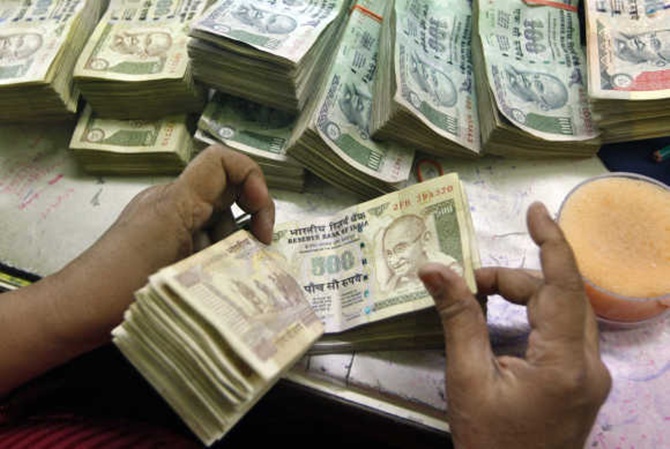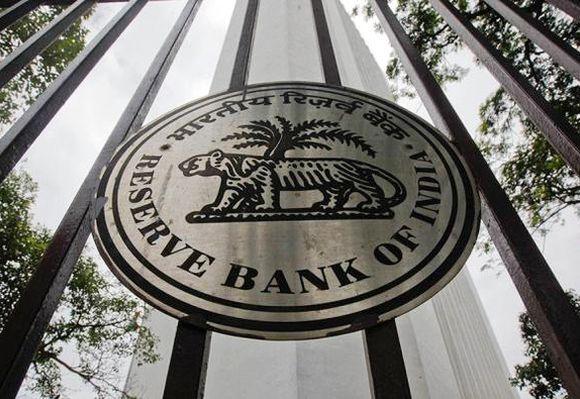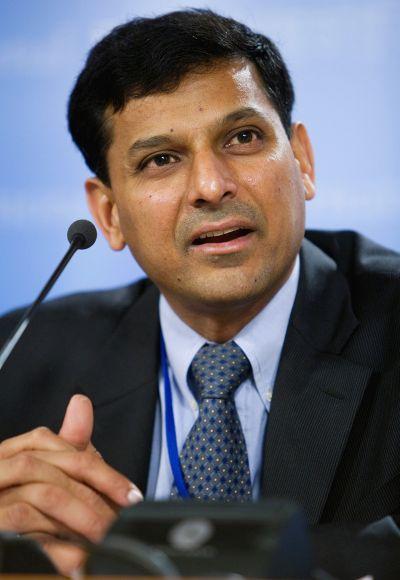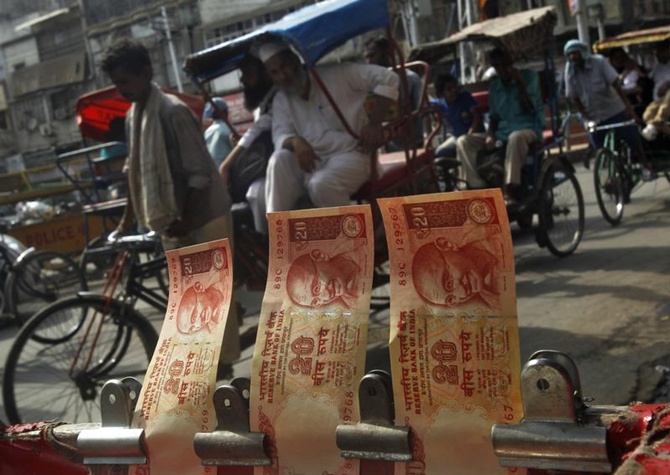Photographs: Reuters Rajeev Malik
The new prime minister should learn from the mistakes of the current government and pay more attention to inflation, says Rajeev Malik.
Dear prospective prime minister,
Hardly any Indian government has come to power with as favourable an economic backdrop of growth bottoming and some revival in the pipeline as is the case now.
Thus, you have a unique opportunity to increase the speed limit on India’s non-inflationary economic growth.
India’s current economic backdrop is also unique in another way: its position relative to other key emerging markets. To be sure, India will likely be the only large, domestically driven emerging market economy to show some pickup in growth in 2014.
More interesting nearer home are the shifting growth dynamics in China and India. Investors are working overtime trying to figure out what all could go wrong with China, while the focus on India has shifted to trying to assess – in some cases, worryingly imaginative – things that could go right.
...
An economic agenda for the new Prime Minister
Image: A farmer works at a field near Chandigarh.Photographs: Reuters
Looking ahead, China’s growth is going to be in a structural downtrend, while India’s will be in a cyclical uptrend. India also has plenty of firepower in reserve, which needs only to be unlocked from structural constraints.
Indeed, it has scope to emerge as a key winner even as China retains its pole position in Asia.
You probably don’t have much background in economics; that shouldn’t be an impediment, in my humble opinion.
More important will be your ability to understand the issues, being decisive and ensuring adequate follow-through. With that in mind, I would like to highlight some non-consensus points that should offer some food for thought for you and your economic advisors.
Contrary to prevailing fashionable opinion, India’s biggest macro challenge is not the collapse in growth. Instead, it is the sticky and uncomfortably high retail inflation.
So inebriated have the current government, the business sector and its lobby groups, and equity investors been in desiring higher growth that the basic importance of low and stable inflation has been ignored.
...
An economic agenda for the new Prime Minister
Image: ndia's growth should accelerate to hit, say, six to seven per cent annually.Photographs: Reuters
There is a popular view that the investment collapse contributed to worsening macro imbalances and crippling of growth. But that overlooks the point that India has continued to suffer high inflation, especially in core retail categories, despite the sharp deceleration in economic growth.
In fact, it is more than likely that if the investment had not weakened as much as it needed to – or if it had recovered sooner or more strongly than has been the case – India’s macroeconomic imbalances, including elevated inflation, would have been much worse.
Growth is already bottoming out, but a pickup in gross domestic product (GDP) growth will be protracted and uneven in the very near term. India’s growth should accelerate to hit, say, six to seven per cent annually within two to three years after it halved to around 4.5 per cent in 2012-13 - but it won’t be a cakewalk.
Whether trend growth does better or remains stuck in the range of six to seven per cent will be a function of how well your government unlocks India’s potential.
...
An economic agenda for the new Prime Minister
Image: Current pro-growth frenzy completely ignores the current still-adverse growth-inflation balance.Photographs: Reuters
It is important to appreciate the above backdrop because the current pro-growth frenzy completely ignores the current still-adverse growth-inflation balance.
Barring the Reserve Bank of India (RBI), the importance of low and stable inflation in creating an enabling environment for lasting acceleration in growth is often self-servingly overlooked.
In fact, any strong economic rebound will probably sow the seeds of its own destruction, as inflation in the largely supply-constrained economy will become a serious issue. Thus, it is important to calibrate the growth upturn in a responsible way.
Three other important issues require your attention (I’m ignoring the mess in the banking sector for now). First, you’ll have to redo the arithmetic of the interim Budget for 2014-15.
...
An economic agenda for the new Prime Minister
Image: RBI Governor Raghuram Rajan.Photographs: Courtesy, IMF
The full Budget announced by your finance minister should clear the decks and present the real picture of the Centre’s finances rather than the selective and distorted reality shown so far. This will be your only chance to set the record straight. People and investors will be more forgiving this time for showing the real picture.
The full Budget should also offer a vision of the fiscal reform agenda, and a road map for credible and good-quality fiscal correction. The Budget is not the forum of addressing all the ills in the economy.
But there is enough in the fiscal mess that will require hard work, especially resisting the misguided industry pressure for stimulus. Work on strengthening the foundation rather than rushing to offer goodies; there will be time for such largesse in later years if the early foundation is strong.
Second, ...
An economic agenda for the new Prime Minister
Image: There will likely be pressure to cut interest rates.Photographs: Reuters
Given the pro-growth and pro-business pressure groups, there will likely be pressure to cut interest rates, perhaps even prematurely.
This will be a recipe for disaster, as has been the case in recent years. No matter how desirable lower interest rates may be, they will remain high for longer unless your government can step up supply-side initiatives to ease inflation; these will be complementary to the RBI’s efforts.
It is unclear what your relationship with RBI Governor Raghuram Rajan will be. Kindly understand that he isn’t a bad governor just because he doesn’t toe your line. His appointment was perhaps the most sensible decision by the current government.
He is neither a bureaucrat nor a pushover, has an enviable international reputation, and seems committed to doing the right thing. Work with him rather than against him.
...
An economic agenda for the new Prime Minister
Image: Shed the current government's fixation with keeping the rupee stronger than it needs to be.Photographs: Reuters
Finally, you should shed the current government’s fixation with keeping the rupee stronger than it needs to be. It is understandably enjoying a herd-driven hope rally.
But significant appreciation from its current level will create problems down the line, especially since export performance hasn’t benefited as much as one would have anticipated from the rupee’s nearly 35 per cent depreciation since end-2007.
High-inflation economies do not have sustained appreciation in their currencies even if there is short-term optimism because of stepped-up portfolio inflows.
As you settle into your new job after a hectic campaign, it is perhaps best to appreciate that the growth spurt that all are wishing for will be more delicate and challenging than is currently envisioned.
It is best not to rush into making promises that will eventually have the same fate as hot-air balloons. And, please, don’t mess up because of senseless hurry. We cannot afford blowing off another opportunity.
The writer is senior economist at CLSA, Singapore.









article